|
(8 March 2011, Cardiff University)
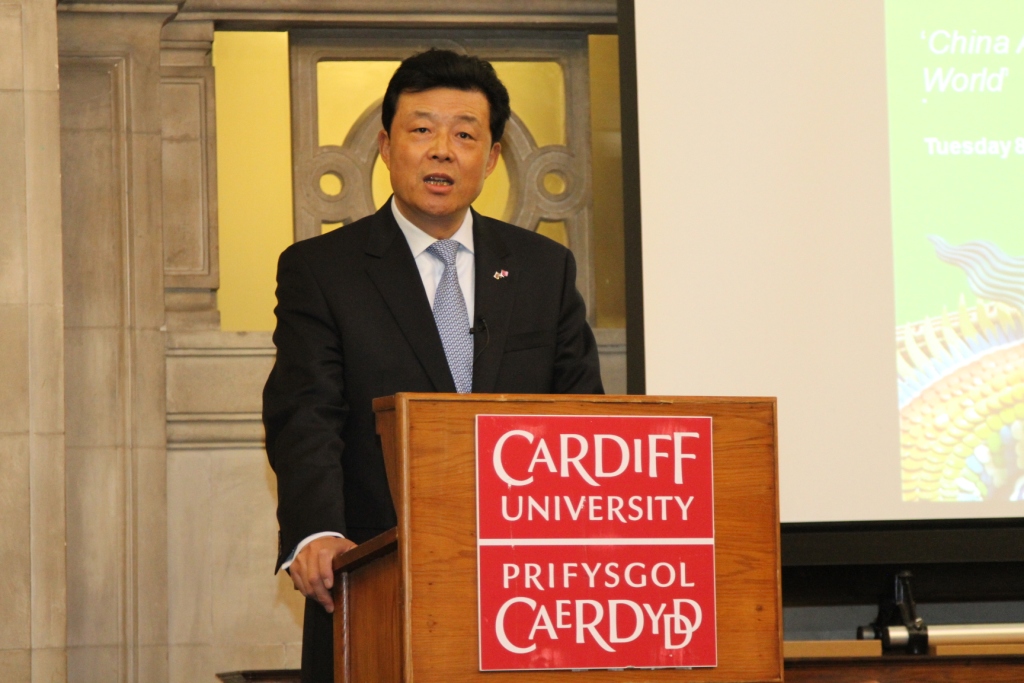
Dr David Grant,
Faculty members and students,
Ladies and gentlemen,
First of all, my warm greetings to all the ladies here on International Women’s Day.
On Monday last week I visited the Lampeter Campus in the University of Wales Trinity Saint David, which is the smallest university in Wales and Europe. Today here I am at Cardiff University, the largest in Wales.
This is the 8th member of the Russell Group that I have visited in the past year. Cardiff University is not only the best in Wales, but is also leading the UK in many fields. I am pleased to know that you have had close exchanges and cooperation with your Chinese counterparts. This has resulted in joint research with China’s Capital Medical University and the signing of an Memorandum of Understanding last year on the training of scientific professionals. The appointment of Dr Grant as an international advisor of Capital Medical will I am sure be of mutual benefit. Cardiff University has also contributed to cultural exchanges between our two countries, by setting up a Confucius Institute in collaboration with Xiamen University.
Although this is my first time in this university, this is my third visit to Wales in the last 6 months. The 250 kilometre journey from London to Cardiff is not a short distance. It took me 3 hours by car to get here. Even if I came here by train, it would have taken me more than 2 hours. But if a high-speed railway link was in place, it would take much less time, maybe only 40 minutes. I guess many people would share this hope. The Transport Secretary Phillip Hammond launched a consultation on high-speed railways just last week. So it seems that a high-speed railway project is set to be launched. In fact, quite a number of other countries are planning to do the same.
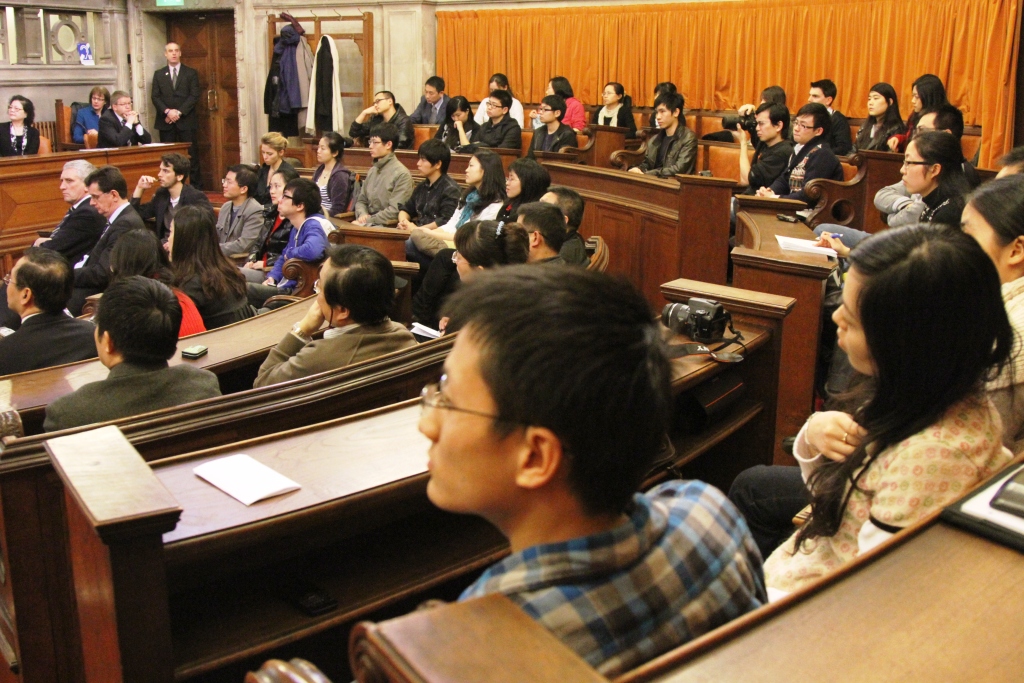
I’m glad to say that China leads the world in high speed railway technology and set records in speed, operational length and scale. China’s high speed rail was not built in one day, nor has China’s development been achieved overnight. It was the result of 30 years of hard work and unwavering commitment to reform and development at home and mutually beneficial opening-up to the world.
Today China has become the world’s second largest economy and has embarked on a new journey of development. So where is the “high-speed train” called China heading after 3 decades? This is something we Chinese are pondering. This is also something the rest of the world is watching with great interest. We in China have come to the following consensus:
Firstly, a reasonable speed of development is important. Despite a record speed of 486 kilometres per hour, it is believed that 350 kilometres is the safest and most economical speed for a high-speed train. This shows that the fastest speed is not always the best. For China, an appropriate, steady rate of growth is essential. Slow growth means insufficient jobs and inability to meet people’s material needs, whilst an overheated economy leads to excessive exploitation of resources and environmental pollution.
The National People’s Congress (NPC) and the Chinese People’s Political Consultative Conference (CPPCC) are currently in session to review China’s 12th Five-Year Plan, China’s economic and social blueprint for the next 5 years. This plan makes scientific development and upgrading of the growth model the primary goals. That is why the Chinese economy is set to grow by only 7% in the next five years, lower than the average 10% of the past 3 decades. Chinese Premier Wen Jiabao recently emphasised that China must improve the quality and efficiency of growth and avoid pursuing unsustainable growth that generates over-capacity and excessive stresses on the environment and resources.
The 12th Five-Year Plan calls for speeding up economic restructuring, boosting domestic demand and increasing consumption. This will be supported through scientific and technological advancements and innovations.
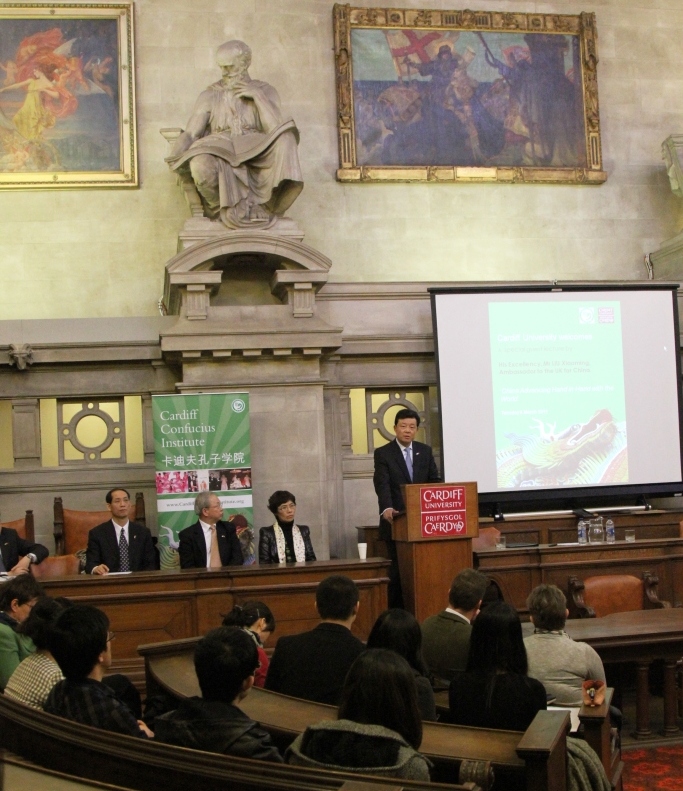
Secondly, moving in the right direction and maintaining stability will be crucial. The advantage of the high speed rail lies not only in its speed, but also in its punctuality, stability and safety. China’s objective is to build a moderately prosperous country by 2020, and a modern, harmonious, democratic, and culturally advanced country by 2050. This is the shared aspiration of the entire Chinese nation. We will never waver despite all the challenges we face.
To achieve these goals, we must carry forward both economic reform and political reform. The system of the National People’s Congress is at the heart of the Chinese political system. It is the Chinese way of democracy, which ensures that all power belongs with the people. We will improve the people’s congress system through further political reform. The ongoing NPC and CPPCC sessions provide a platform for lively discussions and debate among the people on state affairs. I am sure all fair minded people will recognise the relevance and effectiveness of the Chinese political system and how Chinese society is becoming increasingly open and transparent.
Having said that, China is still a developing country. It is endeavouring to achieve industrialisation, urbanisation, and internationalization within a few decades, while these processes have taken developed countries centuries. So it is inevitable that there are economic and social issues we have to deal with. China has entered into a phase many would call “the middle income trap”. China does not shy away from problems, nor is it afraid of challenges. It is confident and capable enough to handle the relationships between reform, development and stability. This will keep the Chinese high-speed train on a steady track and take it to all-round and balanced economic and social development.
Thirdly, a certain comfort level is necessary. Imagine a train with poor air-conditioning and services. Passengers will feel uncomfortable no matter how fast the train is travelling. On the “Chinese train”, we have over 1.3 billion passengers who we hope are enjoying a fast and pleasant journey. It is our ultimate goal to ensure that all of our people enjoy dignified, happy, and prosperous lives, through economic and social progress.
The 12th Five-Year Plan aims to improve people’s lives. We will put in place policies and mechanisms to create jobs, strengthen social programmes and ensure equal access to public services. We will promote fair income distribution and move steadily towards common prosperity. In this way, the benefits of development: education, a decent income, health care and housing will be shared and enjoyed by all of the Chinese people, ensuring that people will be happier as they get richer.
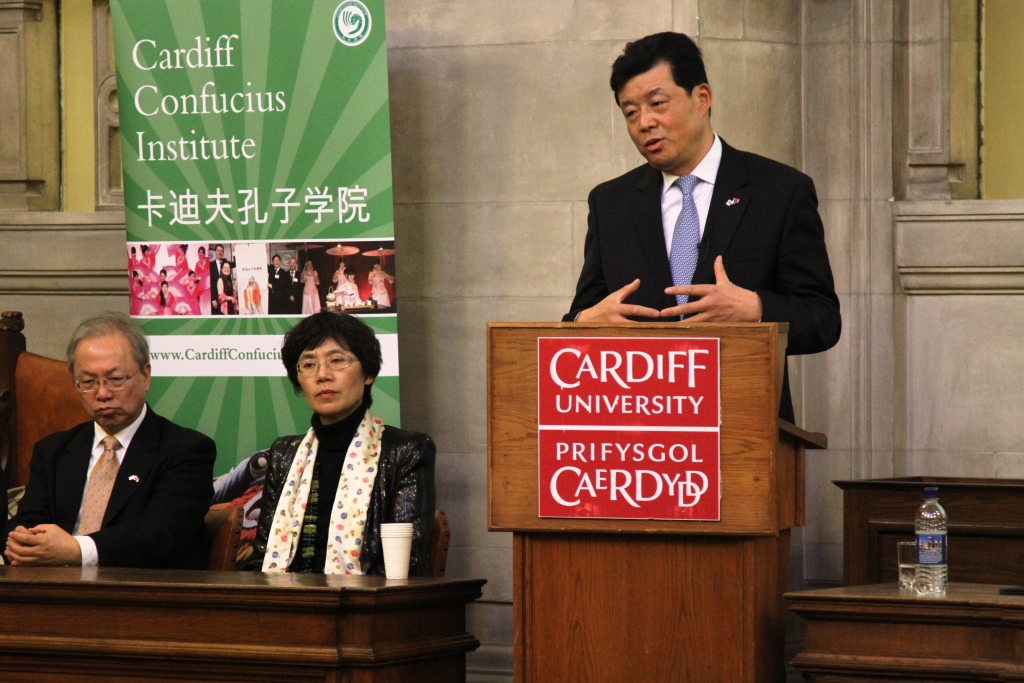
The Chinese government puts people first and governs for the people. Nothing is more important than the people’s interests. Recently as Libya was plunged into unrest, the Chinese government undertook the largest ever evacuation mission to get tens of thousands of Chinese nationals out of the country. Thanks to the coordinated efforts by different departments and agencies, we fulfilled a “mission impossible” by evacuating all of the 35,860 Chinese people in less than 10 days by air, sea and land.
As the “Chinese train” travels on, what does a more developed China mean to the rest of world? I believe China serves as a force for good in the following 3 ways:
First, China can help to restore confidence. China plays a pivotal role as a responsible player during the Asian financial crisis in 1997. As the financial crisis of 2008 hit developed countries and resulted in negative growth, China instilled strong impetus to the global economy by stabilising its economy and maintaining rapid growth. It stood firmly by Europe during the European debt crisis last year. Instead of selling euro assets, it offered a helping hand to its European partners and supported their efforts to recover from the crisis. Chinese economic growth is increasingly becoming an engine and stabilizer of the world economy.
Second, China is creating opportunities. A more developed China means greater opportunities for development and cooperation. Last year, China contributed 20% to global economic growth by maintaining double digit growth rates. As the world’s No.1 exporter, China provides quality and affordable commodities to consumers around the world. But it is also the No.2 importer, importing nearly 1.4 trillion US dollars worth of goods in 2010, one tenth of total world trade. China’s imports from the EU grew by 31.9%, and that from the UK 42%. As China stimulates domestic demand and consumption, it is expected to become the largest consumer market in the world. China has also attracted over 700 billion US dollars of foreign capital over the past decade. This has enabled foreign businesses to be part of China’s development and gain handsome returns. China has invested almost 60 billion US dollars overseas, ranking it first amongst developing countries. China has given record loans exceeding 110 billion US dollars to other developing countries over the last two years, more than that of the World Bank. China’s increasing outbound investment and Chinese businesses’ “going-global” have contributed to economic and social progress, along with job creation around the world.
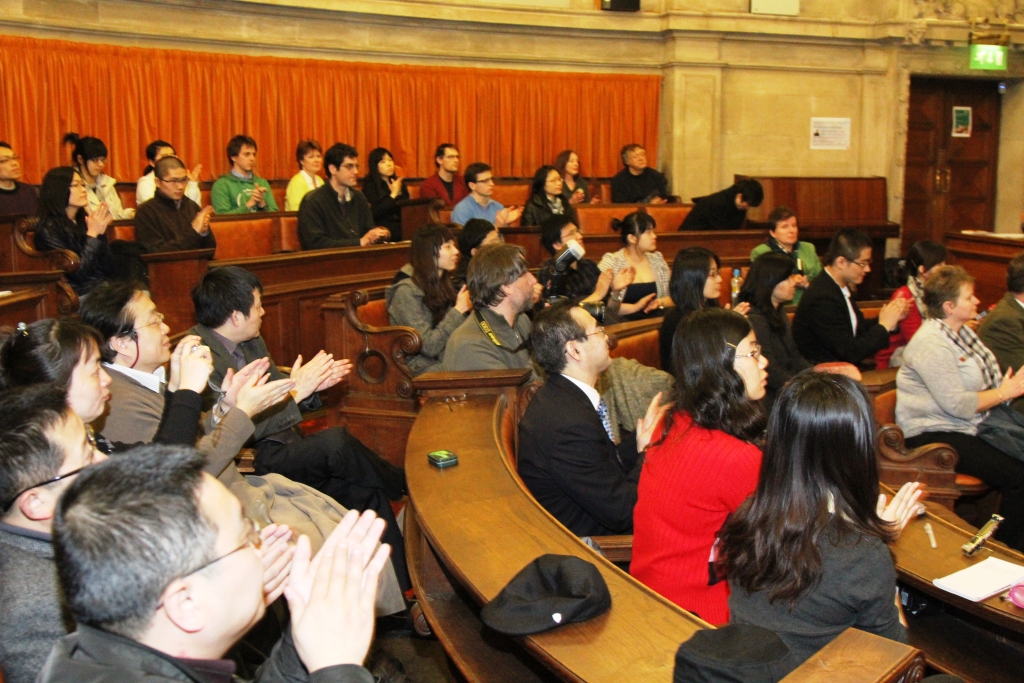
Lastly, China is a force for peace. China’s development calls for a peaceful international environment, and a stronger China means a greater force for world peace. The Chinese nation loves peace, and long for stability and harmony not only for themselves but the world as a whole. China follows an independent and peaceful foreign policy and solemnly proclaimed to the world that hegemony or expansion is not and will never be an option for China. It believes that security should be based on mutual trust, mutual benefit, equality and coordination. China is taking credible steps to play its role as a responsible major player. It is the largest contributor of peacekeepers amongst the UN Security Councils permanent members, having sent 10 thousand peacekeepers on 24 missions; it has sent escort ships to work with fleets of other nations to safeguard international waters off the coast of Somalia; it has played an active part in the mediation process to defuse the Korean and Iranian nuclear and the Darfur crises; it has also played a key role in meeting global challenges such as climate change, the MDGs, terrorism, food security and infectious diseases. And as we repatriated our own citizens from Libya, we also helped to evacuate 2,100 foreign nationals to safety.
To sum up, a stable Chinese train will drive growth and prosperity in the world. China is advancing hand in hand with the rest of the world.
Faculty members, students,
China’s development is a fact and is here to stay. But China’s rise has been new to the international landscape, as there is nothing like the Chinese model. We have seen admiration, confusion and even doubts about China’s development. As a Welsh proverb goes, “The best candle is understanding”(Gorau Cannwyll, Deall). I do hope that students at this university will go to China and experience the real and modern China, because only by observing for yourselves will you understand how China is developing and making progress.
Thank you. I am now more than happy to take your questions.
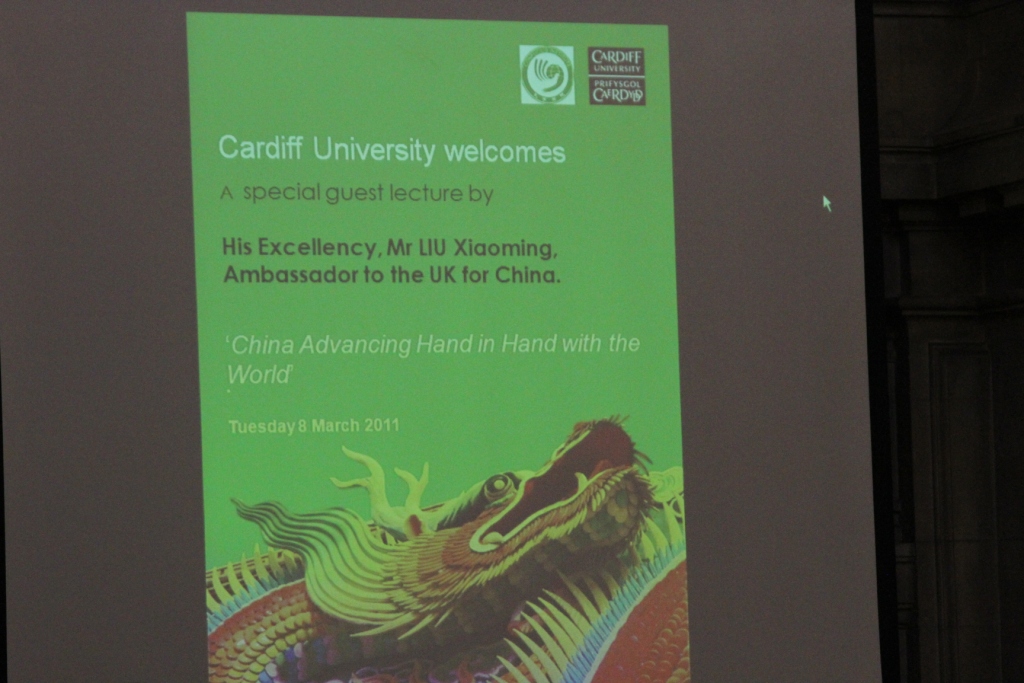
|

